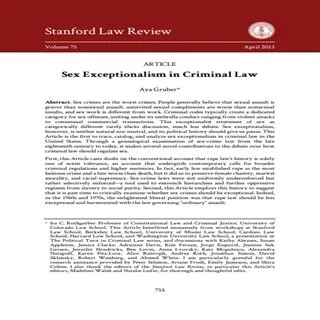By Aya Gruber
Sex crimes are the worst crimes. People generally believe that sexual assault is graver than nonsexual assault, uninvited sexual compliments are worse than nonsexual insults, and sex work is different from work. Criminal codes typically create a dedicated category for sex offenses, uniting under its umbrella conduct ranging from violent attacks to consensual commercial transactions. This exceptionalist treatment of sex as categorically different rarely elicits discussion, much less debate. Sex exceptionalism, however, is neither natural nor neutral, and its political history should give us pause. This Article is the first to trace, catalog, and analyze sex exceptionalism in criminal law in the United States. Through a genealogical examination of sex-crime law from the late eighteenth century to today, it makes several novel contributions to the debate over how criminal law should regulate sex. First, this Article casts doubt on the conventional account that rape law’s history is solely one of sexist tolerance, an account that undergirds contemporary calls for broader criminal regulations and higher sentences. In fact, early law established rape as the most heinous crime and a fate worse than death, but it did so to preserve female chastity, marital morality, and racial supremacy. Sex-crime laws were not uniformly underenforced but rather selectively enforced—a tool used to entrench hierarchies and further oppressive regimes from slavery to social purity. Second, this Article employs this history to suggest that it is past time to critically examine whether sex crimes should be exceptional. Indeed, in the 1960s and 1970s, the enlightened liberal position was that rape law should be less exceptional and harmonized with the law governing “ordinary” assault
Stanford Law Review, Vol. 75, 2023



